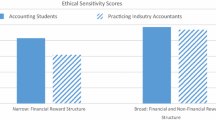Abstract
Graduates of the management major at the University of Pittsburgh at Greensburg find employment in a variety of organizations. As future managers with employees from different professions, students expressed an interest in discussing ethics cases in the operations management class. The semester starts with students familiarizing themselves with various professional and corporate codes of ethics. Throughout the semester a number of short ethics’ cases in operations’ areas such as inventory management, scheduling, facility location, and product design are introduced to illustrate ethical issues that a manager and his/her employees might face. Students prepare individual responses before the in-class discussions. The semester ends with a long group ethics case discussion and formal case presentations. In the end-of-semester survey, students responded very favorably to an ethics component in the operations management class.
Similar content being viewed by others
References
Checkland, P.B. (1989) Soft Systems Methodology, Human Systems Management 8: 273–289.
Singer, A.E., & Singer, M.S. (1997) Management Science and Business Ethics, Journal of Business Ethics 16: 385–395.
Mason, R.O. and Mitroff I.I. (1981) Challenging Strategic Planning Assumptions, Wiley, Interscience.
Linstone, H.A. (1984) Multiple Perspectives for Decision Making, Elsevier, NY.
Ackoff, R.L. (1994) Higher Education and Social Stratification, Interfaces.24/2: 73–82.
Heizer, J. and Render B.R. (2004) Principles of Operations Management, 5th edition, Prentice Hall, USA.
University of Pittsburgh at Greensburg 2004–2007 Catalog, page 107.
Syllabus for the PHIL 1380 course by Dr. Bill Pamerlau, University of Pittsburgh at Greensburg, Fall 2004.
www.nspe.org/ethics/eh1-code.asp
www.pbs.org/wgbh/nova/doctors/oath_classical.html
www.pbs.org/wgbh/nova/doctors/oath_modern.html
http://www.engr.psu.edu/ethics/processl.asp
Shuman, L.M., Sindelar, M., Besterfield-Sacre, M., Wolfe, H., Pinkus, R., Mitcham, C., Miller, R. and Olds, B. (2003) “Assessing Students’ Abilities to Resolve Ethical Dilemmas, “Frontiers in Education Conference, Boulder, CO, November 5–8, 2003.
Pritchard, M.S., ed. (1992) Teaching Engineering Ethics: A Case Study Approach, pp.25–36, NSF Grant No. DIR-8820837.
Kevin Ashley (PI), Rosa L. Pinkus (co-PI), National Science Foundation grant EEC 0203307 -Collaborative Case-Based Learning in Engineering Ethics.
Author information
Authors and Affiliations
Corresponding author
Rights and permissions
About this article
Cite this article
Rudnicka, E.A. Ethics in an operations management course. SCI ENG ETHICS 11, 645–654 (2005). https://doi.org/10.1007/s11948-005-0032-1
Received:
Accepted:
Issue Date:
DOI: https://doi.org/10.1007/s11948-005-0032-1




